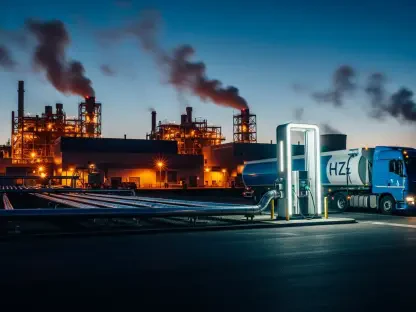In a world increasingly focused on combating climate change, sustainable transportation solutions have become a critical priority for industries worldwide, especially in sectors like aviation where carbon emissions remain a significant challenge. Zurich Airport has taken a pioneering step in this direction by introducing the first-ever passenger bus powered by solar diesel, a groundbreaking renewable fuel. This milestone not only highlights the airport’s commitment to reducing its environmental impact but also showcases a viable alternative to traditional fossil fuels that can be integrated into existing infrastructure. Achieved through a collaboration with Synhelion, a company specializing in solar fuel technology, this innovation marks a significant advancement in the journey toward decarbonization. The successful deployment of this bus during a high-traffic period underscores the potential for solar diesel to transform mobility in areas where electrification faces technical limitations, setting a new standard for sustainability in airport operations.
Pioneering Sustainable Mobility at Airports
Zurich Airport has positioned itself at the forefront of green innovation by operating a passenger bus fueled by solar diesel, a synthetic renewable fuel that offers a nearly CO2-neutral alternative to conventional diesel. Produced through a thermochemical process that harnesses solar heat to convert biogas, CO2, and water into syngas, which is then refined into diesel, this fuel represents a remarkable technological achievement. The bus, fueled with a 190-liter blend of solar diesel, demonstrated its reliability by running for approximately twelve days during the busy fall vacation season. This real-world application proves that renewable fuels can meet the demands of high-intensity operations without requiring modifications to existing engines or systems. By embracing this technology, the airport addresses a critical gap in sustainability efforts, particularly for specialized vehicles that cannot easily transition to electric power due to operational constraints or battery limitations, paving the way for broader adoption across the industry.
This initiative aligns seamlessly with Zurich Airport’s ambitious net-zero strategy, which targets a complete reduction of carbon emissions by 2040. While electrification remains a primary focus for the airport’s vehicle fleet, certain heavy-duty and special-purpose vehicles, such as those used in winter operations, pose unique challenges for battery-powered solutions. Solar diesel emerges as a practical and immediately deployable option to bridge this gap, ensuring that sustainability goals are not compromised by technical limitations. The partnership with Synhelion, a leader in solar fuel innovation, has enabled the airport to test and validate this technology under demanding conditions, reinforcing confidence in its scalability. Statements from airport officials highlight the ease of integrating solar diesel into current operations, emphasizing that this fuel not only reduces emissions but also maintains the efficiency and reliability required for daily services, marking a significant step toward a greener future for aviation ground support.
The Technology Behind Solar Diesel Innovation
At the heart of this groundbreaking development lies Synhelion’s cutting-edge technology, which produces solar diesel through a process that captures solar energy to drive fuel synthesis. By combining solar heat with sustainable inputs like biogas and captured CO2, the process creates a synthetic fuel that mirrors the properties of traditional diesel while drastically cutting carbon emissions. A key advantage of this fuel is its nearly CO2-neutral footprint—during combustion, it releases only the amount of CO2 that was captured during production, making it a far more environmentally friendly option compared to fossil fuels. This compatibility with existing diesel engines eliminates the need for costly infrastructure overhauls, allowing industries to adopt sustainable fuels without disrupting operations. The successful use of solar diesel in a passenger bus at Zurich Airport serves as a powerful testament to the technology’s readiness for real-world applications, highlighting its potential to reshape transportation sectors globally.
The scalability of solar diesel technology is another critical factor driving optimism about its future impact. Experts from Synhelion have emphasized that the production process, already operational at their facility in Germany, can be expanded to meet growing demand across various industries, including aviation and heavy-duty transport. Zurich Airport’s adoption of this fuel for ground operations demonstrates a practical starting point, with potential applications extending to other areas where electrification remains unfeasible. The collaboration between the airport and Synhelion, which began several years ago, reflects a shared vision for defossilizing transportation through innovative solutions. This partnership not only validates the operational feasibility of solar diesel but also sets a precedent for other airports and organizations to explore renewable fuels as part of their sustainability strategies, fostering a collective movement toward reducing global carbon footprints in challenging sectors.
A Model for Decarbonizing Transportation
The broader implications of solar diesel extend far beyond the boundaries of Zurich Airport, offering a compelling solution for industries grappling with the limitations of electrification in their decarbonization efforts. Sectors such as aviation, shipping, and heavy-duty transportation often face technical and logistical hurdles when transitioning to electric power, making alternative fuels like solar diesel an essential component of a comprehensive sustainability framework. The successful operation of the solar diesel-powered bus during peak travel periods provides concrete evidence of the fuel’s reliability and effectiveness under pressure. This achievement sends a clear message to other airports and transportation hubs: renewable fuels can deliver immediate environmental benefits without sacrificing performance, encouraging wider adoption and investment in technologies that support long-term carbon reduction goals across diverse operational contexts.
Looking back, the collaboration between Zurich Airport and Synhelion proved to be a defining moment in the push for sustainable mobility, as it demonstrated that innovative fuels could integrate seamlessly into existing systems. The real-world application of solar diesel in a high-demand environment validated its potential as a game-changer for sectors where traditional decarbonization methods fell short. Moving forward, the focus should shift to accelerating the production and distribution of solar diesel to meet global demand, while policymakers and industry leaders must prioritize incentives and infrastructure to support renewable fuel adoption. Exploring partnerships similar to this one could amplify the impact of such technologies, ensuring that the lessons learned from this initiative inspire actionable steps toward a cleaner, more sustainable transportation landscape for future generations.









